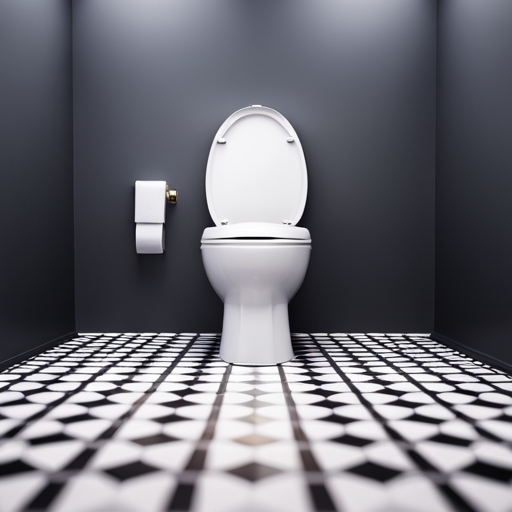Are you tired of scrubbing and scrubbing your toilet bowl, only to find that stubborn hard water stains refuse to budge? Well, it’s time to bid farewell to those pesky stains and hello to a sparkling clean toilet bowl.
In this article, we’ll share with you some effective tips and tricks for removing and preventing mineral buildup in your toilet bowl.
First, let’s explore the causes of these hard water stains. They are typically caused by the presence of minerals like calcium and magnesium in your water supply. When these minerals interact with your toilet bowl, they leave behind unsightly stains that are difficult to remove.
But don’t worry, we’ve got you covered with some simple and effective cleaning solutions. So sit back, grab a cup of coffee, and say goodbye to those stubborn hard water stains once and for all.
Key Takeaways
– Hard water stains in toilet bowls are caused by minerals like calcium and magnesium in the water supply, which can be exacerbated by chemical reactions with cleaning agents.
– There are several methods for removing mineral buildup, including using a vinegar and baking soda mixture, dish soap for tougher stains, and citric acid as an alternative to borax.
– Prevention and maintenance are key to avoiding hard water stains, including regular cleaning and installing a water softener, which removes minerals causing hard water stains and buildup, saves time and money on cleaning products and plumbing issues, extends the life of plumbing systems, and reduces energy usage by improving water heater efficiency.
– However, water softeners may slightly alter the taste of water and may not be effective in extremely hard water areas.
Causes of Stains
You may be wondering why hard water causes those stubborn stains in your toilet bowl. Well, the answer lies in the high mineral content of magnesium, calcium, and iron present in hard water.
When these minerals react with oxygen and carbon dioxide in the air, they form insoluble compounds that stick to surfaces and are difficult to remove. Chemical reactions also occur when hard water comes into contact with cleaning agents, further exacerbating the issue.
The minerals in hard water can react with the active ingredients in some cleaners, causing them to become less effective or even leaving behind residue that can contribute to staining. It’s important to choose cleaning products that are specifically designed to tackle hard water stains and to follow the instructions carefully to avoid any unwanted chemical reactions.
Effective Cleaning Solutions
Using a mixture of vinegar and baking soda can effectively remove mineral buildup in your toilet bowl. Here are three tips to make the cleaning process easier and more natural:
1. Mix equal parts of vinegar and baking soda in a spray bottle and spray the solution onto the toilet bowl. Let the solution sit for 10-15 minutes before scrubbing with a brush.
2. For tougher stains, add a few drops of dish soap to the mixture before spraying. The soap will help break down the minerals and make scrubbing easier.
3. If you prefer borax alternatives, try using citric acid instead. Mix a quarter cup of citric acid with a quarter cup of baking soda and sprinkle the mixture into the toilet bowl. Let it sit for 15-20 minutes before scrubbing.
By using these natural cleaning methods, you can effectively remove hard water stains without the use of harsh chemicals. Plus, these solutions are cost-effective and can save you money on expensive cleaning products.
Prevention and Maintenance
To prevent mineral buildup and stubborn stains in your toilet bowl, it is important to regularly clean and install a water softener to reduce the high mineral content in your water. Hard water stains are unsightly and can be difficult to remove, so it’s best to take preventative measures to avoid them altogether. Regular cleaning of your toilet bowl with a vinegar and baking soda mixture or other cleaning solutions will help keep the stains at bay, but installing a water softener will be the most effective long-term solution.
Water softeners work by removing the minerals that cause hard water stains and buildup. They can be installed at the source of your water supply or directly onto your plumbing system. By doing so, you’ll not only prevent toilet bowl stains, but also extend the life of your plumbing system by reducing the risk of lime-scale buildup. Investing in a water softener will save you time, energy, and money on cleaning products and plumbing issues in the long run.
| Pros | Cons | ||
|---|---|---|---|
| Prevents hard water stains | Initial cost of installation | ||
| Extends the life of plumbing systems | Ongoing maintenance required | ||
| Saves time and money on cleaning products and plumbing issues | May slightly alter the taste of water | Reduces energy usage by improving water heater efficiency | May not be effective in extremely hard water areas |
Conclusion
Congratulations! You’re now armed with the knowledge to tackle those stubborn hard water stains in your toilet bowl. By understanding the causes of the stains, you can choose the most effective cleaning solution for your specific situation.
From natural remedies like vinegar and baking soda to commercial products like acidic cleaners, there is a solution for everyone.
But why stop at just cleaning? By implementing prevention and maintenance strategies like installing a water softener or using a toilet bowl cleaner with every flush, you can avoid future buildup and keep your toilet bowl sparkling clean with minimal effort.
So say goodbye to hard water stains and hello to a stress-free cleaning routine. Your toilet will thank you!
